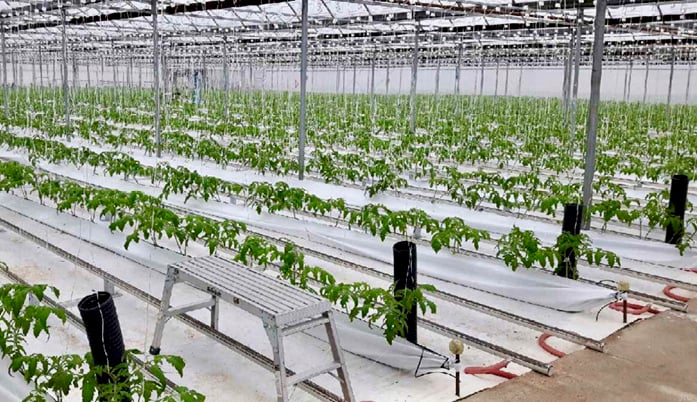Greenhouse expansion a costly prospect for local government

Citing the pressure that large-scale greenhouse developments place on water, wastewater and other services, Chatham-Kent and the Municipality of Lakeshore in Essex County want greenhouse operators to pay more for new builds.
Read Also


Apple and tender fruit growers receive $1.2 million
Ontario’s apple and tender fruit growers will receive nearly $1.1 million from Agriculture and Agri-Food Canada to fund initiatives that…
In Chatham-Kent, a March municipal council decision increased water and wastewater development charges for new greenhouses, a move the Ontario Greenhouse Vegetable Growers say will cost $179,000 per acre.
Why it matters: Local authorities share an ever larger portion of costs associated with development but have few ways to recoup those costs.
Darren Galbraith, general manager of the municipality’s public utilities commission, said in an email that the move was made to ensure the region can achieve the water and wastewater investment goals detailed in its master plan.
Galbraith said development charges (DCs) are collected to recover costs of infrastructure required for growth.
“If DCs are not collected, costs for infrastructure growth would need to come from all current ratepayers, other sources of revenue and grants from upper levels of government, when available,” he said.
Chatham-Kent’s water and wastewater development charges bylaw was to expire on March 25. To establish a new bylaw, Galbraith said a background study was developed using the new master plan information.
The Chatham-Kent Public Utilities Commission plans to spend $545 million on water assets and $436 million on wastewater assets, of which $373 million is due to water growth needs and $44 million for wastewater growth needs. These ares recoverable by development charges.
In the master plan, greenhouses make up 80 per cent of water volume growth and 20 per cent of wastewater volume growth, said Galbraith.
“Due to the large increase in the greenhouse DCs for water, the Chatham-Kent Public Utilities Commission and Council both approved administration’s recommendation to phase in the water charges for greenhouses at 10 per cent for year one, 25 per cent year two, and 50 per cent for years three to 10 for water.”
He said a quick calculation for year one would be $0.87/ft2 for water plus $3.26/ft2 for wastewater, for a total of $4.13/ft2.
Ontario Greenhouse Vegetable Growers responded in a press release, stating the increase would amount to costs of “approximately $179,000 per acre for any new greenhouse development in the municipality.
These development fees will gradually escalate to $366,000 per acre by 2029,” driving greenhouse investment away from the region and affecting local businesses that serve the greenhouse sector.
Galbraith broke down the first amount.
“There is 43,560 ft2 in an acre. $4.13/ft2 x 43,560 ft2/acre = $179,902/acre.”
The OGVG said it recognizes the municipality wants to continue engaging the sector via two actions: an amendment to the bylaw exempting greenhouses that chose to access existing private water and wastewater service alternatives, and the establishment of a multi-stakeholder working group to understand and overcome various challenges and advantages to greenhouse development.


photo:
Courtesy Ontario Vegetable Greenhouse Growers
Lauren Anderson, a councillor representing Chatham-Kent’s Ward 1, said the greenhouse sector could help the region achieve its growth goals. But the need to raise more funds without overburdening taxpayers is a reality made more acute by provincial government actions.
“It’s not just the water. Every utility and resource is being strained. One of the biggest issues is the province has continually taken away their responsibilities, instead putting them on the local authority which has little means of recouping costs,” she said.
“They’re just putting more on the municipalities with really no budget … At the same time, what are we cutting? It’s always rural infrastructure that gets cut. We need help from government to achieve these goals. You can’t expect municipalities with no authority or money to achieve this.”
Land-use designations
The Municipality of Lakeshore tried a different approach. Ryan MacNamara, councillor for Lakeshore’s Ward 1, said his municipality told the province that greenhouse developments should fall under a different land-use category than agricultural.
While open fields and greenhouses both produce food, MacNamara says he considers modern greenhouses more akin to industrial land use. Reclassification could allow different development charges and setback designations so home owners would not find themselves facing greenhouse walls at the property line.
“We’re taking some of the best land in the county, in the province, and paving it over for greenhouses that don’t use soil,” he said, noting the province flatly rejected Lakeshore’s land use redesignation request.
Now his municipality must determine what increase in development charges is needed to support growth.
“We didn’t receive anything in writing as to why, except that it doesn’t go with provincial policy statement for land usage. Now we’re back in negotiations to figure out what the municipality can do,” said MacNamara.
“It’s about trying to strike a balance and explain to the province we support the ability to grow food, but there’s also a cost to this. The tools we’re allowed to use as a municipality don’t cover those costs, which mean the residents have to cover the costs.”
As a board member for the Essex Region Conservation Authority, MacNamara added that Lakeshore residents are also concerned about the greenhouse industry’s broader environmental impact.
Light pollution has been a persistent concern among residents, as have concerns over water quality degradation. Indeed, he said greenhouse developments in the neighbouring municipalities of Leamington and Kingsville are already affecting Lakeshore watersheds.
Source: Farmtario.com

